A Suitable Boy: An interview with the writer Vikram Seth
Vikram Seth
Writer
Vikram Seth's novel A Suitable Boy, a panorama of post-independence, post-separation India comes to the 主播大秀, in an adaptation scripted by Andrew Davies. Vikram explains the story's origin, introduces its main themes and some of the key protagonists.
Watch A Suitable Boy on 主播大秀 One and 主播大秀 iPlayer from Sunday 26th July
Watch the trailer for A Suitable Boy. A six-part adaptation of Vikram Seth's coming of age story, which follows student Lata who is torn between family duty and the promise of romance, as three very different men try to win her heart. Starts 26th July on 主播大秀 One and iPlayer.
Where did you get the idea for the novel? Had you any idea it would have such universal appeal?
This fat book came out of a very tiny seed. It was a bit of conversation that I heard on a bus in India, a mother telling her daughter: "You’ve got to marry someone chosen by me." And in fact the first sentence of is:
‘“You too will marry a boy I choose,” said Mrs Rupa Mehra firmly to her younger daughter.’
And of course this led to the idea that it should begin with a wedding, and at a wedding there are lots of wedding guests and I got interested in all their lives. That’s why, rather than being a simple story of a mother trying to find a beau for her younger daughter, it became a much broader novel, largely through the guests at the wedding of her elder daughter. That’s how it began. But I didn’t think that it would take such a long time to write or that the book – being a very Indian book – would become popular in other parts of the world. I think one reason for that is that everyone has mothers and many people have daughters, and Mrs Rupa Mehra, the matriarch of the novel and one of its main protagonists, is a seen as a sort of Universal Mum – though she is in fact based on my own grandmother.
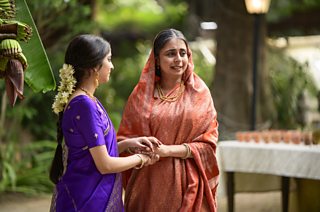
Lata Mehra (TANYA MANIKTALA), Mrs Rupa Mehra (Mahira Kakkar) in A Suitable Boy (Image Credit: 主播大秀/Lookout Point Photographer: TAHA AHMAD)
Can you tell us a bit about the themes addressed in the novel, and how they evolved?
I thought that A Suitable Boy would simply be one of those girl finds boy or doesn’t find boy, mother hovering in the background, kinds of books. I never thought it would lead to something that involved the countryside and land reform and the and religious conflict and other large themes, such as the position of women in Indian society. That happened because, as I got more and more involved with my characters, the book itself started following them. I’m not saying it ran away from me, but it certainly walked away from me and then I had to shepherd it back into shape.
A Suitable Boy is dedicated to my father and mother and to the memory of my grandmother. Family matters hugely to me. Despite the fact that the book has all these macro themes of riots and elections and festivals and so on, at its heart it deals with the heart.
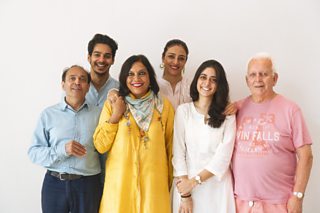
Vikram Seth, Maan Kapoor (ISHAAN KHATTER), Mira Nair, Saeeda Bai (TABU), Lata Mehra (TANYA MANIKTALA), Andrew Davies (Image Credit: Aradhana Seth/主播大秀/Lookout Point)
For anyone who hasn’t read the book, could you tell us about the plot?
I don’t want to give the game away, but here goes. There are three possible suitors for Lata (Tanya Maniktala), who is a young woman, about 20 years old. One is a fellow student and cricketer [Kabir], one is a writer [Amit], and one is a shoemaker [Haresh] (he studied in the UK, but he comes home to India and he’s involved in shoe manufacturing). Their characters are entirely different. The first is very attractive and young – how would I put it? – he’s a dish! She calls him a ‘cad’ – the term derives from Cadbury chocolates, not from his caddish behaviour – so he’s very edible, let’s say! The second chap is intellectual and slightly unsure of himself, but quite well-known, and intriguing in his own way. And the third chap is practical, self-confident, maybe even a bit bumptious.
One of them is Muslim and Lata is Hindu, and that brings the full pressure of her family – and society in general – down upon her. And then of course the question is, how does she make up her own mind, or is her mind made up for her? And to what extent has she grown up during the course of the novel or, in this case, of the television serial?
The other strand of love in A Suitable Boy is that of a young wastrel, the son of a Minister who is in charge of land reforms. His name is Maan (Ishaan Khatter), and he’s one of my favourite characters, because he’s got a sort of devil-may-care aspect to him. He spends his time falling in love with everyone, all the time. His love affair with a courtesan leads to some of the great complications in this book, including violence and the results of that violence.
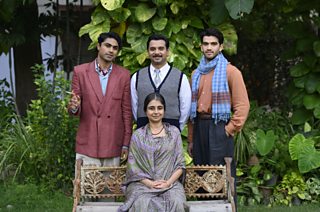
Mrs Rupa Mehra (Mahira Kakkar), Amit Chatterji (MIKHAIL SEN), Haresh Khanna (NAMIT DAS), Kabir Durrani (DANESH RAZVI) from A Suitable Boy (Image Credit: 主播大秀/Lookout Point Photographer: SHARBENDU DE)
Can you tell us about the time period in which the novel takes place?
A Suitable Boy mainly takes place in 1951, at a time when India, newly partitioned and independent, and now the largest democracy in the world, was once again, somewhat fumblingly, discovering its soul. This larger story of India parallels, in some ways, Lata’s own discovery of herself and how she fits in with the life of her family, of society, and of the country. She gradually realises what motivates her, and the values she wants to live by.
What were your initial thoughts on the novel being adapted for television?
I ignored (the production company) and the 主播大秀 (who said they wanted to programme it) for months after they approached me. I just thought it would be one of those innumerable projects that never see the light of day. For me, as a writer, it would simply be time-wasting, distracting noise. Almost thirty years after writing A Suitable Boy I was now immersed in A Suitable Girl. I was not going to let Boy strangle Girl.
When I next happened to be in London, I somewhat reluctantly agreed to a quick pre-work meeting at my place with a couple of people from Lookout Point. Once I talked to them, I realised that even without my involvement, they had in fact lined up lots and lots of ducks in a row. There were only two or three ducks missing – the largest missing duck, of course, was me. They were very serious about the project and their enthusiasm was infectious. I put Girl on the back burner and we had a number of meetings about Boy over the next few days. Everything was signed and sealed in a matter of weeks.
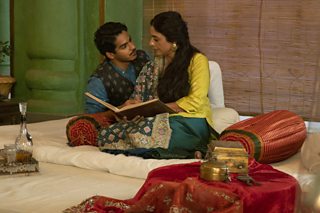
Maan Kapoor (ISHAAN KHATTER), Saeeda Bai (TABU)(Image Credit: 主播大秀/Lookout Point Photographer: TAHA AHMAD)
Can you tell us about your experience working with the scriptwriter, Andrew Davies?
I had known for some time that Andrew was keen on doing A Suitable Boy. I decided to look at his War and Peace, and later at Les Misérables. Andrew has a huge gift for bringing the essence of an expansive book into believable and human vignettes. And yet not just vignettes, but something organically connected.
knows how to use both scalpel and suture. He knows how to anaesthetise you, kill whichever darlings he feels it’s necessary to kill, and then bring things back to life – not as a Frankenstein composite but as an integrated avatar – six hours of potentially compelling television.
I’m sure it was easier for Andrew to deal with Tolstoy or Hugo – he didn’t have to bother about what they thought – but he’s been very accepting of my suggestions. If something in the script did not ring true in the context of early post-Independence India – and how could Andrew possibly have known every detail of that? – I pointed it out, and he took it on board.
As for plot cuts and changes: it had been a long time since I wrote A Suitable Boy, so I was somewhat teflonised against what happened to every minor incident or character. I would not compromise with the essence, the core of the book – but I was less bothered about the periphery. There were several occasions where I thought: ‘That’s brilliant, Andrew. It really works! It may not be what I wrote, but it’s true to the spirit of the book, true to the spirit of the characters.’
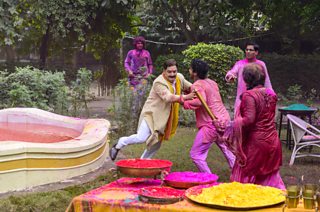
Mr L N Agarwal (VINAY PATHAK), Maan Kapoor (ISHAAN KHATTER), Pran Kapoor (GAGANDEEP SINGH RIAR)(Image Credit: 主播大秀/Lookout Point Photographer: TAHA AHMAD)
Can you tell us about working with the director, Mira Nair?
A story – whether a book or a play or a movie or a television serial – has to be believable. And ’s films are very close to the truth of the people from whom the story springs.
She can handle, in a masterly manner, both the macro and the micro – the intimate details as well as the larger picture.
One of her loveliest movies is – an intimate story that takes place on two different continents. It’s about an Indian girl, originally from Uganda, who falls in love with a black guy when her family moves to Mississippi – and all that arises from that affair in both communities; and of course in the third community as well, the white community. Watching that movie brought home to me Mira’s wonderful ability to bring out the joy, the sadness, the humour, the tension of ordinary people’s lives, without laying it on too thick. That is a great skill and that is what attracted me to her. Also, she has huge energy and I wanted one person to direct all six episodes, so that the vision of it would remain unified. Incidentally, it’s funny that now all the main people involved in the project – the director , at Lookout Point, and both producers, and – are women. I wonder what Lata would have made of that.
What do you think some of the visual highlights of the serial will be?
Mira knows the world of northern India intimately – our great festivals, the turbulence or calmness of scenes on the river Ganga, the confusion of a riot, the beauty of a gulmohar tree, the look and feel and sound of monsoon rain, the freshness of monsoon foliage. She has a very fine visual touch, which of course is enhanced and realised by her director of photography, . But I would emphasise the fact that this is not a travel brochure. Even more important than visual beauty is the truth of the feelings, of the complex emotional structure of the story.
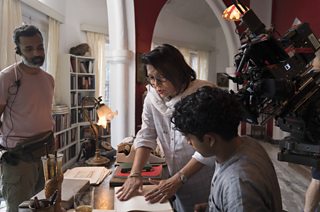
Mira Nair, Amit Chatterji (MIKHAIL SEN) Behind the scenes (Image Credit: 主播大秀/Lookout Point Photographer: Sharbenu De)
How relevant are the themes explored in the novel today?
Well, it’s this thing isn’t it – ‘’ – the more it changes, the more it remains the same. A Suitable Boy was written thirty years ago about a period that is now seventy years in the past. Many of these themes – poverty and unemployment, religious intolerance, the conflicts of caste, the complexities of family life, the position of women, the pressure of society on the individual, India’s place in the world (whatever that means), the danger of democracy slipping into dictatorship, stress and distress in the countryside, the joys of festivals and pilgrimages, the insane popularity of cricket, the ubiquity of films and film songs – many of these themes, both urban and rural, both political and personal, are being replayed again.
But there are obvious changes too. Just as the depiction of a story has to be true to its place, it also has to be true to its time. The significance of a kiss, even of a boy and a girl holding hands – is very different today from what it was in 1951. The dynamics of communication – even something as simple as making a phone call to another city – once required hours of waiting by the telephone. Then too, as now, anxious parents consulted astrologers to fix the date and time of a wedding; but no one in a provincial town in 1951 would ever have dreamed of dancing a bhangra at a wedding, which has virtually become a fixture nowadays. Even in cricket, that perennial delight and secular Indian religion, no bowler in 1951 would have bowled a and no batsman would have attempted a !
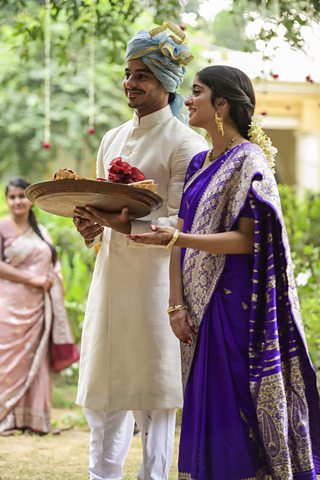
Maan Kapoor (ISHAAN KHATTER), Lata Mehra (TANYA MANIKTALA)(Image Credit: 主播大秀/Lookout Point Photographer: TAHA AHMAD)
Can you tell us about some of the other characters in the story?
There’s Saaeda Bai (Tabu), the delectable but quite hard-headed courtesan, who has a great love of Urdu poetry. Young men are sent to her to be educated, not just in the ‘art of love’, so to speak, but also in high culture. At that time, patronage for courtesans was gradually dying out. We don’t have courtesans any more; we have either singers or prostitutes. But this idea of the courtesan … I love her because she’s a very passionate character and her story is one that I find both complex and touching.
Maan is caught up in her toils, or rather ensnares himself, sometimes against her advice, and that leads to a conflict with one of his best friends.
Another major character is the Nawab Sahib (Aamir Bashir), a decorous, scholarly man. It was at his family’s grand estate in the country that many of the meetings that led to the partition of India and the formation of Pakistan took place. But unlike some in his family, the Nawab Sahib always believed in an India that was united and that treated all its citizens alike and fairly, regardless of their religion. The Nawab Sahib has a secret from his youthful past that he has tried to cover over with a decent and respected middle age. But it does emerge, to the immense cost of many people around him.
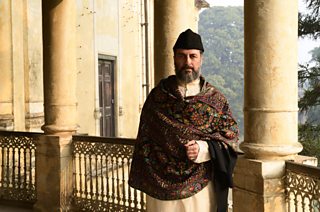
Nawab Sahib (AAMIR BASHIR KHAN)(Image Credit: 主播大秀/Lookout Point Photographer: TAHA AHMAD)
What’s the significance of this story being brought to the screen – will it have universal appeal?
I hope so. At any rate, I don’t think one should consciously try to be all-inclusive or universal. If a story is authentic and authentically depicted, it will reach its audience.
Love, hate, ambition, power, possession, death, remorse, tenderness – these are universal themes and emotions, no matter where or when one finds them, or whether one finds them in a sari or a sarong.
Shimon Peres once said to my mother: ‘Mrs Rupa Mehra is a Jewish mother.’ She replied, ‘No, Vikram based her on my mother.’ He said, ‘Nevertheless, nevertheless.’ And I myself have heard almost identical comments from Welsh people and Greek people and Iranians and Brazilians and God knows whom. But she’s Indian; she is, in fact, my own grandmother.
How do you hope audiences react to the story?
I hope some people will fling their popcorn at the screen in anger when Lata makes a certain decision. I hope other people will say, ‘That’s exactly right – that’s the person she should have chosen.’ I want people to have very diverse feelings about the story. One thing I don’t want them to do is to go to sleep!
Watch A Suitable Boy from Sunday 26th July 2020 on 主播大秀 One and 主播大秀 iPlayer
